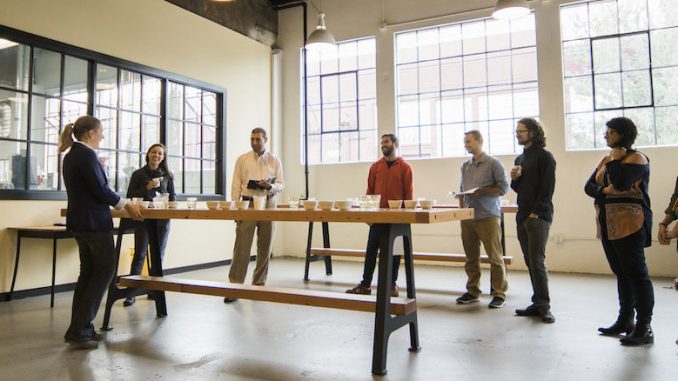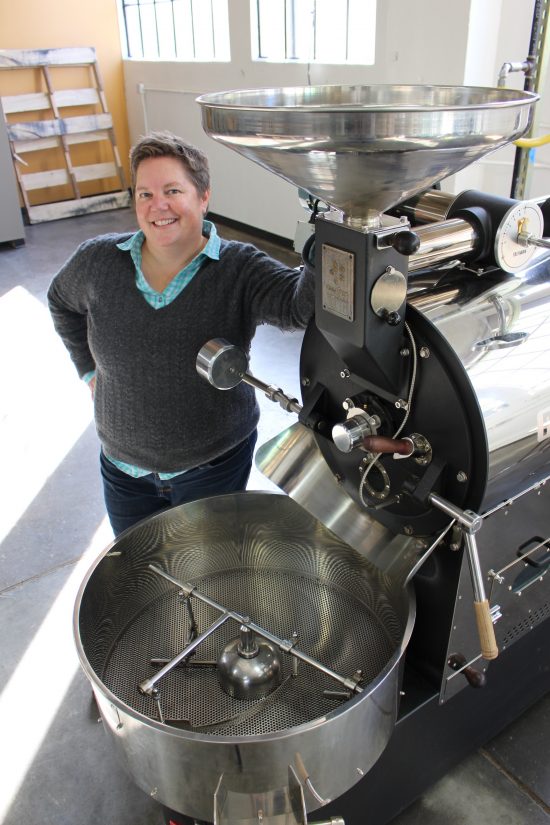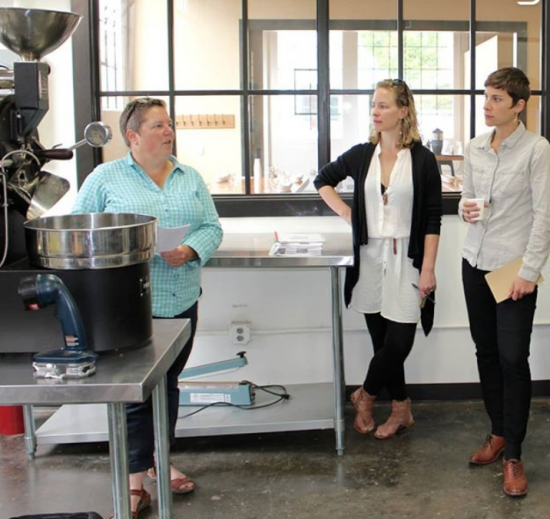
The co-founder of Buckman Coffee Factory talks to us about discovering coffee and running a business during the pandemic.
BY CHRIS RYAN
BARISTA MAGAZINE ONLINE
Photos courtesy of Joey Gleason
In 2015, Joey Gleason (she/her) and her sister, Cassy, opened Buckman Coffee Factory in an expansive building in Portland, Ore.’s Central Eastside neighborhood that used to house a printing press. The sisters, who also own and operate Portland’s Marigold Coffee, sought to open a communal roasting space where other small roasting companies could share equipment, thereby lessening their investment. Since then, the Buckman has become a dependable institution in Portland’s coffee culture, attracting several of the city’s top roasters, as well as hosting events for the community. We talked to Joey about getting into coffee, starting the Buckman, and adapting during the COVID-19 pandemic.
Chris Ryan: How did you get started in the coffee world?
Joey Gleason: I’m originally from Eugene, Oregon, and after college I moved back to Oregon—to Portland—and started working in restaurants. I was training to be a chef with the hopes of opening up my own place one day. I loved the energy of the kitchen, working with food, the creativity, and all of the people that make up a good restaurant. It slowly became clear to me that I was a morning person, and to be successful and happy I was going to have to shift my dreams. That’s when I started learning pastry and how to bake.
Eventually, I met some folks who shared my dream of self-ownership and started Redwing Coffee and Bakery in Portland. It was there that I fell in love with coffee. We had a small roaster and I learned how to roast coffee. For me, roasting coffee will always be an extension of my culinary education. Although I respect and lean upon the science of roasting, my deepest connection to coffee is through the art and magic of food.

How did you then end up starting Buckman Coffee Factory?
When my sister Cassy and I started Buckman Coffee Factory, our goal was to provide our company, Marigold Coffee, a home along with other small roasters. Our thought was that as a small company, we were working too hard to buy expensive equipment in order to compete with much larger roasters—if we shared the costs of equipment and capital investment, we and other small roasters like us would be on a much more level playing field. In that regard, we could focus on the craft of coffee rather than the machine of coffee.
I also saw that in the coffee community, unlike the restaurant and food community, we did not have a good place to collaborate and learn from each other. When we created Buckman Coffee Factory, we wanted to create a space where all kinds of coffee people could meet and learn from each other. We had farmers and importers, and small roasters and larger roasters, all there to be a part of our events and teach classes.
I learned more about coffee the first year at the Buckman, because of all of the people I met and was able to talk with, than I did my whole time in coffee before then. Our hope was always to create a space where small roasters could compete through perfecting their craft and their business models, and worry less about the capital investment of machines.
Can you talk a bit about how Buckman Coffee Factory approached the COVID-19 pandemic?
Since COVID we have changed dramatically. First off, at the Buckman we had so many social events that just ground to a halt. That was super disorienting because that aspect of our business was a huge part of our identity. We closed the facility to the public right away in mid-March 2020. It was pretty heart-wrenching, but it seemed clear that it was the first step we had to take. At Marigold Coffee, while we were still able to roast for grocery and wholesale, we also made the decision to close Marigold’s cafe after coming to an impasse with our landlords. There was just too much liability in terms of navigating the health and safety of our staff while facing plummeting revenues. The hardest part, without a doubt, was having to let staff go not knowing if or when we could bring them back. We’re still hoping to reopen our cafe, but at this point we’re very careful not to get ahead of ourselves.
At Buckman, we had to evaluate safety in a changing environment with so many unknowns and errant information at all levels. At a base level, Cassy and I kept coming back to two questions. With the knowledge that we have, are we able to operate safely? If the answer to the first question is yes, what does it look like to operate safely? We made a commitment to answer these two questions every week. We also were running two businesses at the same time, so we had to answer those questions for both businesses.
The main thing we had to do was change how the facility operated in terms of employee safety. We have Marigold employees who we are responsible to and we have other companies at Buckman, but in normal times we are not directly involved in their day-to-day safety or management besides following basic rules and standards. After COVID, Cassy and I realized that every person coming into the facility had to operate with similar safety protocols in order to keep all of us safe.
Luckily for us, the folks who roast here and the businesses we work with have all been very like-minded and invested in safety. It is the ultimate “we are all in the same boat” analogy in terms of all of us working in the same facility.

What were some of the steps you then took?
We instituted a really strict mask policy early on. It was definitely awkward and strange at first, but it seemed like a small adjustment given the risks. This was before we could really buy masks, so we bought our first masks for our whole staff from a barista friend who had recently been laid off, Emma Nolley, who was sewing on the side. I was so impressed with her ingenuity and work.
I had been watching what Korea was doing in terms of staying in business during the pandemic, so early on in February I purchased infrared thermometers for our facility and staff. We created a check-in station where everyone takes their temperature and signs in when they enter the facility. This station is also a way that we can trace back if there is ever anyone who comes into the facility that ends up being positive, and we will be able to notify folks who have been in the facility at the same time that they were.
We shifted all of our work stations so we could all be six feet apart; luckily we have plenty of space. We also staggered our roasting times and shifts so people were not overlapping in work spaces.
In December 2020, we instituted a new mask policy that requires everyone to either wear a KN95 mask, a surgical mask, or an N95 mask. This is because these masks range from 80-95% protection; this way we know the masks folks wear to the facility have a measurable amount of protection. Also these masks are available and easier to purchase. We have boxes of surgical and KN95 masks at the check-in desk so anyone can grab one if they don’t have their own. It is a higher cost for us, but the price is small compared to the risks.
Finally, what do you enjoy doing outside the world of coffee?
I love soccer—I love my home team the Portland Thorns. I love hanging outdoors when the weather is good, and lately I have been really getting into birds.

